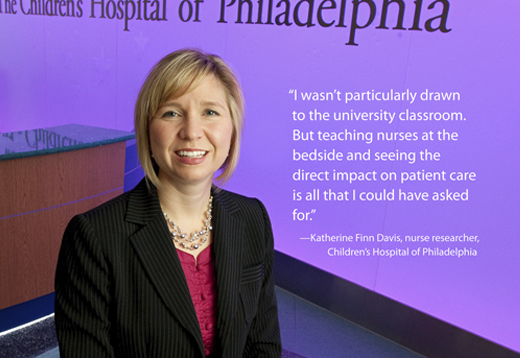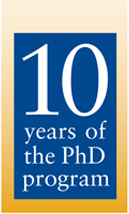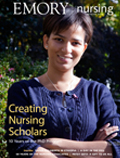Bringing research skills to the bedside

Katherine Finn Davis 97MSN 05PhD found her dream job at Children’s Hospital of Philadelphia.
|
Global science: saving mothers and infants |
She could not have imagined it when she began practicing as a pediatric staff nurse 15 years ago. Her job embodies the value that health care institutions place on nursing research and on nurses who incorporate evidence into their practice. It requires Davis to use every ounce of what she learned as a doctoral student in the School of Nursing.
Part researcher and part research teacher, Davis works with the hospital’s Center for Pediatric Nursing Research and Evidence-Based Practice and also teaches at the University of Pennsylvania School of Nursing. As a researcher, she continues to study sleep and illness in preschool children, work she began while a graduate student at Emory. A current project looks at whether children with cancer who sleep poorly have a poorer immune response to influenza vaccinations.
As a teacher, Davis helps Children’s staff nurses become more research savvy, empowering them with skills to look critically at their own nursing practice and seek and apply new scientific knowledge to change nursing practice. She describes herself as a translator, helping nurses distill vast amounts of scientific information to improve health outcomes.
While Children’s administration encourages nurses to improve their practice using evidence and to conduct research, many nurses lack the training to follow through. Davis guides and mentors them through searching and critiquing the literature, designing and developing a protocol, negotiating the complex approval process, conducting the study, analyzing the data, disseminating findings, and turning results into practical applications at the bedside.
“I wasn’t particularly drawn to the university classroom,” says Davis. “But teaching nurses at the bedside and seeing the direct impact on patient care is all that I could have asked for.”
The path to Davis’s current position followed her natural bent for asking questions. She discovered nursing almost by accident, volunteering at a hospital while a student at the University of North Carolina. When she saw nurses’ impact on patients, she switched her major from business to nursing. Her first years of working as a pediatric staff nurse were both fulfilling and frustrating. Yearning for more autonomy, she completed a master’s degree and pediatric nurse practitioner certification at Emory.
Both delivered on the autonomy promise when Davis practiced alongside an Atlanta ear, nose, and throat pediatric surgeon, who valued her nursing perspective. When the surgeon left the practice, there were hugs, promises to stay in touch, and a heart-to-heart conversation about future options.
“You are always asking why we prescribe this medicine versus another, why we teach patients this way instead of that way,” Davis recalls her colleague encouraging her. “Why not return to school and use that knowledge to improve clinical practice?”
Then 29 and recently married, Davis returned to Emory for a PhD. Though she missed her practice, she found the perfect environment for thinking critically from a variety of perspectives.
“I learned the languages of doctors, social workers, psychologists, and public health experts and how these and other disciplines could be brought together to bear on nursing issues and vice versa,” says Davis. “Today, as a nurse researcher at Children’s, not a day goes by that someone does not say to me, ‘Oh, I had not thought about it that way.’ And not a day goes by that I don’t thank the School of Nursing for what its doctoral program taught me.”



